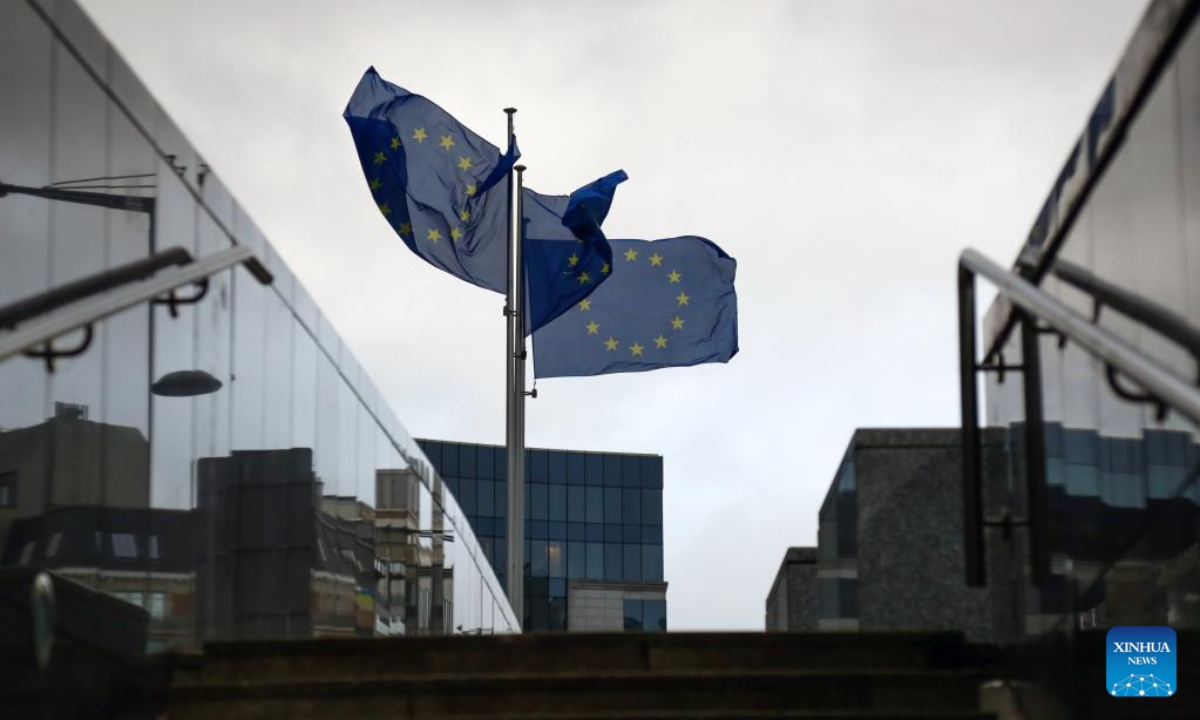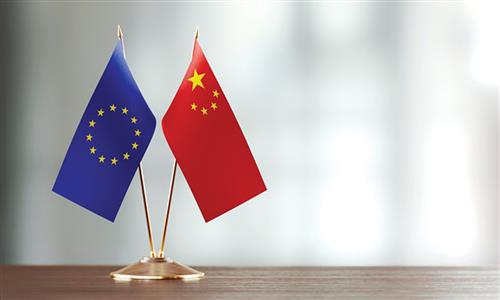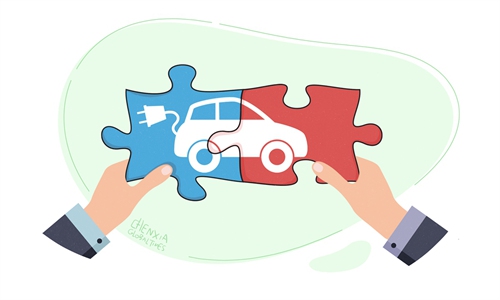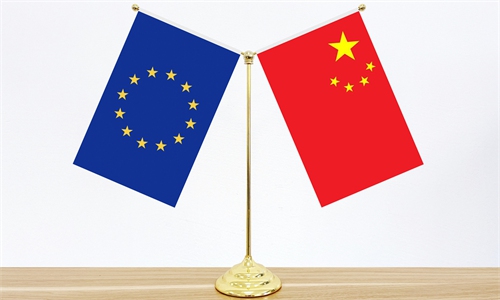
EU flags are seen outside the European Commission in Brussels, Belgium, Jan 6, 2023. Photo:Xinhua
On December 16, local time, the EU announced the adoption of its 15th sanctions package against Russia. Among these measures, under the pretext of "supplying sensitive components to the Russian military industry," the EU for the first time adopted so-called "fully-fledged listings" on Chinese entities and individuals. In response to these unilateral sanctions that have no basis in international law or authorization by the UN Security Council, China's Ministry of Foreign Affairs expressed strong dissatisfaction and firm opposition, stating that China will do what is necessary to firmly defend the legitimate and lawful rights and interests of Chinese companies. The EU should carefully consider China's warning.
On the Ukraine-Russia conflict, China is committed to promoting talks for peace. China never provides lethal weapons to any party involved in the conflict and strictly controls the export of dual-use articles, and China's scope and measures of export control over drones are the most stringent worldwide. These are undeniable facts.
In contrast, the EU's decision is hasty. A notable detail is that after the sanctions were announced, EU High Representative for Foreign Affairs and Security Policy, Kaja Kallas, admitted that "I haven't checked whether it's true, but this is what the Ukrainians are saying," in response to the claims that "China was giving Russia the satellites that are provided for killer drones." The accusation against China is merely based on hearsay.
In fact, most countries, including European countries and the US, have continued to trade with Russia. The US-Russia trade in October increased to its highest level since spring.
The demand for China to stop or suspend its normal interactions and cooperation with Russia is not only inconsistent with international law but also morally unjustifiable. The reason the new round of sanctions from the EU had been in the works for a long time was due to a provision regarding whether EU companies should be prohibited from continuing to operate in Russia. Due to significant internal disagreements, the final version merely included non-binding language encouraging EU businesses to consider winding down businesses in Russia, while it took aggressive action against Chinese enterprises. This fully exposes the EU's double standards and hypocrisy.
At the press conference on Monday, Kallas also declared, "helping Russia in this war has a cost for China," adding that the EU must "really be strong here and show our unity." These remarks highlight the increasing divisions within the EU regarding how to handle the Ukraine crisis. Shifting blame onto China and making Chinese enterprises pay the price for the prolonged crisis will not demonstrate the EU's "strength." Instead, it reveals the EU's lack of political wisdom and courage in pursuing a ceasefire. Notably, just two months ago, Washington imposed sanctions on two Chinese companies under a similar pretext, and the EU immediately followed suit. We have to ask: How much autonomy and independent judgment does the EU still retain concerning the Ukraine crisis?
Regarding the current round of sanctions, the European side needs to understand: First, on the issue of China-Russia trade, China will not abandon or relinquish its legitimate rights. Second, while China values its relationship with the EU, this does not mean it will tolerate the erroneous actions of the EU side. No one can arbitrarily "provoke" China without paying any prices. Third, indefinitely extending the so-called "sanctions list" to include more countries, such as China, India, and the UAE, will only isolate the EU internationally and further complicate the Ukraine crisis.
In English, the phrase "barking up the wrong tree" is used to describe someone who is pursuing the wrong course of action. In the narrative of some European political elites, the ongoing Ukraine crisis is attributed to "China helping Russia." This is a classic case of "barking up the wrong tree." It is not difficult to determine who is supplying lethal weapons on a large scale to the battlefield. A simple truth is that the more weapons sent to the battlefield, the harder it becomes to achieve a ceasefire. What the Europe should truly be grateful for is that the vast majority of countries around the world have maintained strategic calm despite the pressure to align with the West, thereby avoiding a global confrontation. In this sense, these countries are not the "opposite" of the Europe; rather, they are genuinely helping the Europe.
We understand Europe's security anxieties facing the Ukraine crisis; however, such anxieties cannot be alleviated by shifting blame onto China. China has always stood on the side of peace, maintaining contact with all relevant parties, including Russia and Ukraine, and persistently promoting talks for peace. These efforts have received widespread recognition and support from the international community, including many countries in the Europe.
In promoting the overarching goal of peace in Europe, China and Europe are aligned. Europe cannot expect China to play a greater role while simultaneously disregarding or even belittling China's legitimate concerns. Such behavior is unwise.



